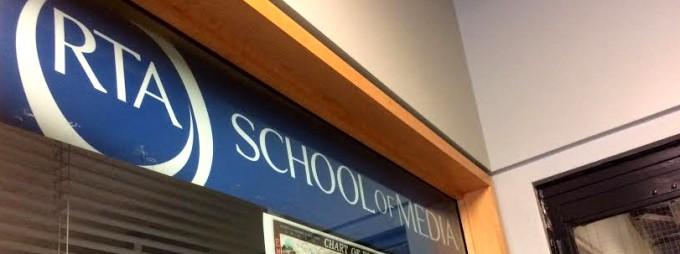By Justin Chandler
There is not enough space, money or course-intention guarantee in the RTA School of Media’s production courses to accommodate students who want to take them.
In their second year, media-production students pick one of several courses to specialize in a specific stream. But some students, even those who do course intentions to indicate they want to take a course, may not be able to — like second-year media-production student Gillian Pownall.
Students can pick between audio, single-camera (also called electronic field production), multi-camera and digital media in their third semester.
Pownall is now enrolled in a single-camera production course, but a lack of spots initially kept her from getting in.
Despite her indicating she wanted to take single-camera at the start of the course-intention period in spring 2015, she was not put into that stream. Pownall was told there was no room in that course and that she would have to wait until next year to take it.
“Of course I was livid,” Pownall said. She said people who have good grades and do course intentions should be guaranteed spots in their preferred classes.
RTA student affairs coordinator Donna Morrison said sometimes there is not enough space in a course because there isn’t enough money in school budgets to hire instructors or buy equipment.
Other times, courses are overbooked because students sign up for more courses than they actually want, as RAMSS doesn’t limit the number of courses students can take.
Morrison also said these situations may arise because not enough students do course intentions.
“[Course intentions] are considered mandatory. Every student is emailed and [told] if you don’t do course intentions, there is no guarantee you’re getting a timetable,” Morrison said.
The course intentions process helps faculties plan courses by determining how many seats they need to allocate. When students don’t do course intentions, faculty can underestimate the demand for a course, Morrison said.
When a course is overbooked come open enrollment, RAMSS will randomly pick students who signed up to take it and put them into the course, Morrison said.
She said that in some cases, a selection process based on students’ GPAs will determine if they can get into overbooked courses.
Morrison told Pownall not getting into her preferred course wouldn’t be a setback, but Pownall wants to continue in the advanced single-camera stream next year and would have had to delay her plans, she said.
Pownall said she asked Morrison to put her name on a sticky note and keep it by her computer in case somebody dropped the course. A student did and Morrison was able to get Pownall into the course for the third week.
Joelle Farrow, a second-year media-production student, did course intentions and was placed in the single-camera course for her third semester, but decided she wanted to change her stream. She said she does not like the course as much as she thought she would and wants to study multi-camera now — a decision that could impact the rest of her undergraduate degree.
Farrow said she tried to switch courses on RAMSS when the option was open, but the site lagged and she missed her chance.
She talked to Morrison and tried to find someone to switch with but couldn’t. She said having to take single-cam is a positive as she’s now decided she’ll take the multi-cam course next year, but may not be able to take as many electives as she would have liked to.
Morrison said it can be difficult for students to know by spring what they want to study in the fall, but they still need to be aware of what they’re signing up for when they do course intentions.
Morrison also added that professors should do more to remind students to do course intentions, and that she thinks her email reminders to students about course intentions often go unread.










Leave a Reply